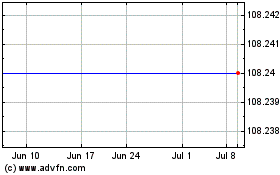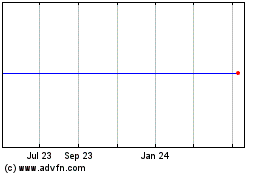Bristol-Myers to Buy Padlock Therapeutics
March 23 2016 - 9:20AM
Dow Jones News
Bristol-Myers Squibb Co. said Wednesday that it would acquire
privately-held Padlock Therapeutics Inc., the latest attempt by a
large pharmaceutical company to grab a chunk of the growing
autoimmune disease market.
Terms of the deal weren't disclosed, and a spokesman didn't
immediately return a request for comment.
Cambridge, Mass.-based Padlock focuses on developing treatments
for autoimmune diseases, and Bristol-Myers said the acquisition
will give it full rights to Padlock's program for "potentially
transformational" treatments for patients with rheumatoid
arthritis. The company said the program may extend to treating
systemic lupus erythematosus and other autoimmune diseases.
Specifically, Padlock is working on an inhibitor called
protein/peptidyl arginine deiminase—or PAD—a family of enzymes that
produce autoantigens that play a part in the development and
progression of certain diseases. Inhibiting PADs offers the
potential to prevent progression of autoimmune diseases early in
their evolution, Bristol-Myers said.
According to the Center for Disease Control, rheumatoid
arthritis afflicts roughly 1% of the world's population, with
prevalence among women.
For Padlock, the transaction includes upfront and contingent
milestone payments of up to $225 million, plus additional
consideration of up to $375 million, contingent on the clearance of
certain regulatory hurdles. The companies expect to close the deal
in the second quarter.
Drugs for autoimmune diseases, including rheumatoid arthritis,
ulcerative colitis and psoriasis, offer one of the pharmaceutical
industry's biggest markets.
The world's top-selling prescription drug, AbbVie Inc.'s Humira,
treats rheumatoid arthritis and psoriasis. Cancer-drug company
Celgene Corp. last year struck a $7.2 billion deal to buy Receptos
in its bid to bolster its autoimmune portfolio, at the time pegging
the market's sales potential at $93 billion in sales in 2020, up
from $67 billion in 2015.
Companies including Gilead Sciences Inc. and Eli Lilly & Co.
have collaborated with smaller biotechs to develop autoimmune
treatments. Lilly, for its part, said this week that the U.S. Food
& Drug Administration approved its Taltz injection to treat
plaque psoriasis. The company is also working on an RA medication
with Incyte Corp.
Write to Lisa Beilfuss at lisa.beilfuss@wsj.com
(END) Dow Jones Newswires
March 23, 2016 09:05 ET (13:05 GMT)
Copyright (c) 2016 Dow Jones & Company, Inc.
Celgene (NASDAQ:CELG)
Historical Stock Chart
From Mar 2024 to Apr 2024

Celgene (NASDAQ:CELG)
Historical Stock Chart
From Apr 2023 to Apr 2024
